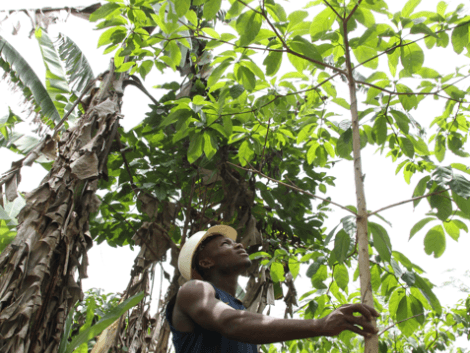

News | 08.04.2022
The workshop to launch the UFA-REFOREST project took place on March 30, 2022 in Yaoundé. This project is financed by the EU within the framework of the Programme for Improving Governance in Forestry (PAMFOR). Four forestry companies are involved in this project because of their willingness to be innovative operators in forestry. The duration of the project, managed by ATIBT in consortium with Gembloux Agrobiotech, ENSET - Douala and Nature +, will be four years, ending in early 2026. The partner companies are Alpicam, Pallisco, SEEF and SEFAC.

The development of natural timber resources contributes significantly to Cameroon's GDP. This sector is one of the leading private sector employers, both upstream and downstream, through a whole network of SMEs, VSEs and artisans.
The country has approximately 22 million hectares of forests, or nearly 46% of the total area of the country. The forests allocated primarily to wood production, also known as FMUs (Forest Management Units), represent approximately 6.7 million hectares. Most of the wood export production comes from these FMUs.
TROPICAL TIMBER - A PRIME RESOURCE FOR THE COUNTRY
The national industrial production is estimated at about 3.5 million m³ of logs and 1 million m³ of sawn timber per year. The exploitation is very selective, 3 species (ayous, sapelli, tali) contribute to more than 50% of the production. This selectivity has little impact on the forest cover, but it results in a rarefaction of the main species exploited. Natural regeneration alone will not be able to reconstitute the initial forest stock, and silvicultural methods are required.
A NATURAL RESOURCE TO BE ASSURED IN THE LONG TERM
In order to maintain the forest potential, in quantity and quality, it is essential to combine natural regeneration with silvicultural methods involving the planting of trees, giving priority to local species with a high heritage value.
Forestry operators, who are granted concessions for a period of 30 years, must be encouraged to implement pragmatic silvicultural techniques because using legal and responsible tropical timber is an investment in the future, in a sustainable habitat while acting for the environment. All actors must therefore join forces to meet this challenge: government services, private companies and local populations.
TECHNICAL CHALLENGES
Within the framework of the UFA-REFOREST project, it is planned to carry out a forest enrichment action using different techniques in FMUs allocated to four private companies, with in particular the implementation of a monitoring system capitalizing on the results and ensuring the follow-up of the performance of the local species planted.
Among the challenges that the forestry operators will have to overcome, we can mention:
- The supply of quality seeds (harvested in the concessions) to nurseries to produce seedlings of species with high heritage value);
- Maintaining trees in logging pits, log yards and plots under difficult conditions; and diverse and complex environments;
- Involvement of local communities and indigenous peoples in silvicultural operations;
- Involvement of the private forestry sector in forest cover restoration, as well as riparian communities;
- The involvement of the private forestry sector in discussions on forest cover restoration, as well as riparian communities;
-The sensitization of stakeholders on the results obtained;
- Economic analysis of timber production and carbon sequestration.
The project will capitalize on the proven expertise of the partners in order to implement efficient reforestation models, already applied and validated in voluntary forest concessions.
A LINK WITH FUTURE CAMEROONIAN REGULATIONS?
The UFA-REFOREST project also aims to maintain the existing close link with the Cameroonian Forestry Administration (MINFOF), to collaborate with it and to inform it about its implementation and results. It is in fact no more and no less than to reflect on the future of silviculture within the framework of sustainably managed forest concessions in order to help update the normative framework in favor of the restoration of forest cover on a national scale.
This will include:
- Organize joint enrichment monitoring activities with MINFOF and other Cameroonian ministries, in particular MINEPDED, and research ;
- Support the implementation of incentives from the administration and/or partners;
- Promote post-project sustainability and multiplication of plantations with partner companies.
The project will collaborate particularly with the competent structures of MINFOF and ANAFOR regarding the capitalization of silvicultural results based on a joint monitoring of the work.
tag(s) :